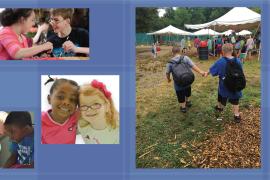The plane climbed steeply, banking left, headed south and east. The early morning hues of brown and beige marked the desert Southwest's approach to the Sandia Mountains, a fault block range on the eastern edge of the Rio Grande Rift.
Beautiful.
But my sense of awe was less about the scenery below than the experience I'd just left behind.
What was it? The 2017 ACA National Conference in Albuquerque, New Mexico.
Truth be told, I was surprised by my reaction to the 68 hours I had spent with my fellow camp directors. Because I attend and speak at this event each February and have worked in organized camping for more than 40 years, I generally go expecting, well, the expected. Yet I am almost always surprised by the freshness of the fare, the quality of the content and the connection with colleagues.
The theme, "Creating the Exceptional," provided a platform for learning and — eventually — execution for more than 1,200 participants representing thousands of camps and millions of children and young adults nationwide.
What did I learn?
I learned from Ross Turner, chairman of the ACA board of directors, that a new "Camp Includes Me" initiative focuses on inclusion, fusion, and cross-cultural agility; from Tom Rosenberg, the new president and CEO of ACA, that we, collectively, are on a path to change the world; from Shimi Kang, MD, that "authoritative" camp staff (much like authoritative parents) more closely resemble pods of dolphins than tigers or jellyfish. I learned from Harriet Lowe, editor-in-chief of Camping Magazine, that in the coming 15 months I'll be writing feature articles on identity and adolescence, why those with ADHD thrive at summer camp, and how alignment and engagement make camp counselors successful; from Chris Thurber, PhD, that both camps and schools may benefit from my work on restorative justice. And I learned from Kerry Plemmons, MBA, of the University of Denver Daniels College of Business, that reward and recognition (of staff), when repeated, equal revolution. He referenced Robert Frost's poem "Two Tramps in Mud Time" (Frost, 1934).
My object in living is to unite
My avocation and my vocation
As my two eyes make one in sight.
Only where love and need are one,
And the work is play for mortal stakes,
Is the deed ever really done
For Heaven and the future sakes.
Futures sakes, indeed.
Most of all, however, I reveled in the commonality of purpose, the sharing of mission, and the promise of hope.
Much of that hope is captured in data, both "basic" (which measures increases in behavior and thinking) and "detailed" (which measures current status plus change due to camp experience), on traits including responsibility, exploration, independence, competence, family citizenship, friendship skills, affinity for nature, problem-solving confidence, and spiritual well-being (ACA, 2017).
This was, and always is, a gathering of quite extraordinary people — from the so-called old people in camping (OPICs) to the emerging professionals in camping (EPICs). Each, to some extent, epitomizes that often-elusive career goal of loving what you do so much that you never have to work a day in your life. To wit, New York Times columnist Adam Bryant stated in his keynote address, "I've never seen so many smiling people. Every time I get on an elevator it's like a block party."
Adam was talking about teamwork, a hallmark of all successful summer camps. In other words, families are fine, teams are better. Why? Because on a team everyone has an important role to play (and, of course, because good teams can resemble close families).
Perhaps most remarkable is that what were planted as seeds of exceptionalism in Albuquerque are now of full root and blooming in summer camps across the country. Undoubtedly, camp conferences provide a wealth of information for camp directors to share with counselors beginning the most important work of their lives: serving youth and families.
The returns on that service, as I stated in my piece "Best Summer Ever," "reveal themselves in such outcomes as the ability to make and keep friends; work in peer groups more effectively; rely less on adults and other people to solve problems; develop more confidence in the ability to succeed and contribute positively to family; become more curious, more inquisitive, and more eager to learn new things . . . at camp, in school and, likely, for life" (Wallace, 2017).
As the dusty desert morphed into grids of green in west Texas, my self-reflection was complete and, naturally, revealed the obvious.
This is called creating the exceptional.
References
ACA. (2017). Youth outcomes battery. Retrieved from ACAcamps.org/resource-library/research/acayouth-outcomes-battery
Frost, R. (1934). Two tramps in mud time. New York: Spiral Press. Retrieved from etymonline.com/poems/tramps.htm
Wallace, S. (2017, January 12). Best summer ever. LinkedIn. Retrieved from linkedin.com/pulse/bestsummer-ever-stephen-gray-wallace?published=t
Stephen Gray Wallace, MS Ed, is director of the Center for Adolescent Research and Education (CARE), a national collaborative of institutions and organizations committed to increasing positive youth outcomes and reducing negative risk behaviors. He has broad experience as a school psychologist and adolescent/family counselor and serves as director of counseling and counselor training at Cape Cod Sea Camps, a member of the professional development faculty at the American Academy of Family Physicians and the American Camp Association and a parenting expert at kidsinthehouse.com and NBCUniversal's parenttoolkit.com. He is also an expert partner at the Risk Assistance Network & Exchange (RANE) and was national chairman and chief executive officer at SADD for more than 15 years. Additional information about Stephen's work can be found at StephenGrayWallace.com.
© Summit Communications Management Corporation 2017 All Rights Reserved




